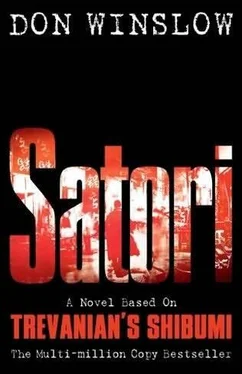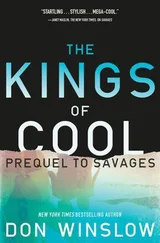Nicholai turned his head in the direction of the shot.
Colonel Yu lowered his pistol.
The monk, standing behind Yu, squatted beside Nicholai and said, “Satori.”
“You’re late,” Nicholai said.
Then he blacked out.
Part Three: WULIANG MOUNTAINS, YUNNAN PROVINCE, CHINA
THE SOUND OF A FLUTE WOKE HIM.
At first Nicholai thought it was a bird singing, but then he heard the deliberate repetition of a particular phrase and realized that he was listening to someone play a lusheng.
But there was birdsong in the background.
Birdsong and clean fresh air, and then he knew that he was no longer in the city, or in the tight, fume-choked back of an army truck, but somewhere in the countryside, perhaps even in the wilderness.
He turned toward the slight breeze he felt on the back of his head, but movement was still painful and difficult, and it took him over a minute to roll over and feel the cool air dry the sweat on his face.
His leg throbbed in protest of the motion.
A voice snapped an order in a language that Nicholai did not understand, and then he heard footsteps quickly shuffling across a wooden floor.
He didn’t know where he was, but then it seemed like a long time since he had known. The last thing that he clearly remembered was his fight with the formidable bajiquan practitioner and his rescue by Yu and the monk. He remembered waking up briefly in the back of what must have been a truck – because its rattling forced him to suppress a scream of pain before he blacked out again. He recalled being given a shot of what was probably morphine, and the deep, painless slumber that followed, and he had a vague memory of being lifted out of the truck and placed in another, soft worried voices, and a nightmare in which he heard concerned whispers and hushed discussions about amputating his leg.
Now he reached down in alarm and felt with intense relief that both limbs were still attached to his body. But his left leg was hot and swollen, and now he recalled the fevers and the shaking, his head being lifted to receive sips of bitter tea, and the horrible pain as the truck bounced over rough roads as it first climbed and then descended hills.
Indeed, Nicholai saw that he was in the hills now. Outside the window he saw a lush forest of firs, pines, camphor, and nanmu trees in a series of rolling ridges below him. The landscape seemed impossibly green, after the white and silver of Beijing, and the blackness of the journey to this place, wherever it was.
Maybe I’m dead, Nicholai speculated without alarm. Perhaps this is chin t’u, the paradise promised by the amida Buddha. But the “pure land” was not for killers, and he had killed Yuri Voroshenin with a single leopard strike to the heart.
At first he thought this might have been part of his morphine-induced dreams – crazy, twisted images of Solange, Haverford, shengs and dans and sharp wires and men dressed all in black. But then he realized that the memory of killing Voroshenin was just that – a recollection of an actual event, and he felt some satisfaction at completing his mission, even though the Americans had betrayed him.
Nicholai blamed himself as much as them.
I should have seen it earlier, he thought as he lay in what he now realized was a hammock. I should have known that Haverford never intended to honor his part of the deal.
Even this small mental exertion exhausted him and he sank deeper into the hammock, feeling only now that his clothes were soaked with sweat. His leg hurt and his body still ached from the beating he had absorbed in the Temple of the Green Truth.
Then Nicholai heard footsteps and felt the palm of a hand on his forehead. The hand lingered for just a moment and then he heard a voice he recognized as the monk’s say, “The fever has broken. Good. For a while we thought we were still going to lose you.”
“So I am alive.”
“But shouldn’t be,” the monk answered. “By all rights, you should be in bardo, awaiting rebirth.”
“Perhaps I am.”
“Perhaps we all are,” the monk said. “Who knows? My name is Xue Xin.”
“Michel Guibert.”
“If you wish,” Xue Xin said, a trace of amusement in his voice. “We need to turn you back over now, and change your clothes. It will hurt.”
Nicholai felt two pairs of firm hands on his shoulder and then they turned him onto his back. A jolt of pain shot up from his leg to the top of his head and he swallowed a grunt of pain.
Xue Xin looked down on him, and Nicholai recognized the man from the bridge to the Jade Isle, the alley outside the opera, and the Temple of the Green Truth. His close-cropped hair was jet black, but what seized Nicholai’s attention were his eyes – they looked through you, albeit not unkindly.
If Xue Xin was eaten up with sympathy, it didn’t show on his face. “You will have tea.”
“No, thank you.”
“You will have tea,” Xue Xin said.
The “tea,” Nicholai decided, tasted like wet grass, but Xue Xin insisted that the brew of herbs was healing his infection.
“If you want to live, drink,” Xue Xin shrugged. “If you don’t, don’t.”
Nicholai drank.
Colonel Yu was relieved to see the American agent looking better.
At first they thought he was going to die. He’d lost a great deal of blood from the bullet wound and had taken a severe beating as well. The internal damage from the bajiquan blows alone would have killed a man with less ki, and the leg quickly became infected.
Nor did they have the leisure to give him adequate medical care. They’d had to get the American out of Beijing, and quickly. Yu’s own PLA staff carried him to a waiting army truck that quickly drove out to the Ring Road, where they transferred the unconscious man to a military convoy headed south. An army medic dug the bullet out of his leg in the moving truck. Then they managed to hook up a blood transfusion and started to administer morphine for the pain.
It might have been easier to let him die, Yu thought – dispose of the body and simply shrug at the mystery that swept across official Beijing like the north wind.
The government was rattled, to say the least.
The Russian commissioner Voroshenin was dead – officially from a heart attack suffered while watching the opera, but no one in the intelligence or military communities believed that, not along with the “coincidental” murder of Kang Sheng, found with a wire thrust through his eyeball and into his brain.
The American plot had worked perfectly.
Moscow and Beijing were busy blaming each other, Mao dug a hole and pulled it closed over himself- especially with his dog Kang no longer there to protect him. General Liu remained the calm and stable figure, ready to step in to end the chaos.
The only problem, Yu thought now as he looked at Nicholai, was the “disappearance” of a French citizen, Michel Guibert.
He had been seen going to the opera. Voroshenin’s guards, quickly summoned home to Moscow, had reportedly claimed that Guibert was sitting beside Voroshenin in his private box at the time of his death but got up suddenly and left.
Then disappeared.
Was he dead?
Was he involved in Voroshenin’s death?
In Kang’s?
Beijing and Moscow buzzed with rumors. Some had it that Guibert had killed Voroshenin, others that it was his assistant Leotov, who had also disappeared shortly after his boss’s death.
The Russians claimed that Guibert was a Chinese agent, the Chinese countered that he was Russian. Each accused the other of hiding him at the same time that each accused the other of killing him to stop him from talking. To quote the Chairman himself, “All is chaos under the heavens and the situation is excellent.”
Читать дальше












